
 Image: Kathy Yakal/Compute
Image: Kathy Yakal/Compute
Remember floppy discs?
The dawn of the personal computer in the 1970s promised the greatest change in American instructional methods since the 19th century—which is when schools began to use standardized textbooks. While the fulfillment of the personal computer’s educational promise is debatable, the machines’ commercial impact on education is not: During the 1980s, public school systems and universities across the United States threw themselves headlong into the PC revolution, investing hundreds of millions of dollars in computer systems, accessories, and software. Tech companies eager for new customers were happy to oblige, and a new educational market was born.
Soon it became common for most schools (some of which were perpetually under-funded) to assemble their expensive new computers in one place for group instruction. And thus was born the computer lab. In the slides ahead, we’ll take a trip back in time to visit some of these formational learning grounds of the 1980s.
Learning Logo on the Apple IIe (1988)
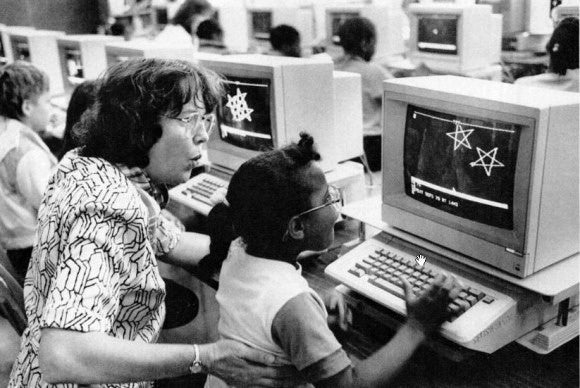
Image by Nancy Palmieri/Crisis
The Apple II series hit U.S. education in a big way during the 1980s, with Apple giving out almost 9,000 Apple IIe machines to eligible schools in California starting in 1983. By 1987, more than one million Apple IIs were in use at American schools. That created a huge installed base that quickly became flooded with educational titles (one estimate from 1987 says there were 8,000 to 9,000 educational packages for the Apple II alone). This further reinforced the Apple II’s grip on the American educational computer market.
One of the most popular educational programs was Apple Logo II, seen here, in which students would program the path of a “turtle” to draw lines on the screen.
Apple Lisas at University of Michigan (1983)
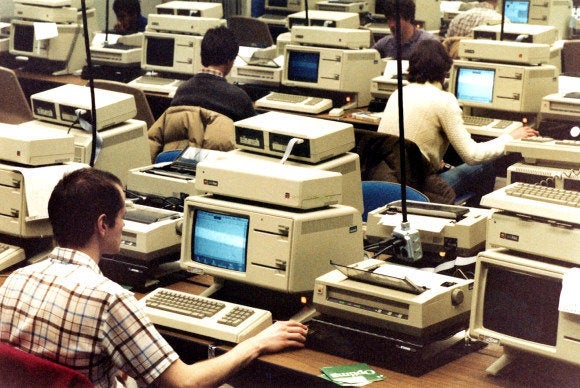
Image by University of Michigan
Universities invested in computer labs in a big way in the 1980s. One of the most dramatic examples can be seen in this 1983 photo of the University of Michigan’s Computer Aided Engineering Network Lab, which was stocked with 100 Apple Lisas.
Keep in mind that these machines cost $9,995 a piece in 1983 dollars. That’s about $23,864 today, so when adjusted for inflation, the total price tag of this computer lab would be $2.3 million today. Considering the major flop of the Lisa, this is likely the largest collection of Lisa 1 machines ever assembled outside of an Apple factory.
Learning with the Commodore VIC-20 (1982)
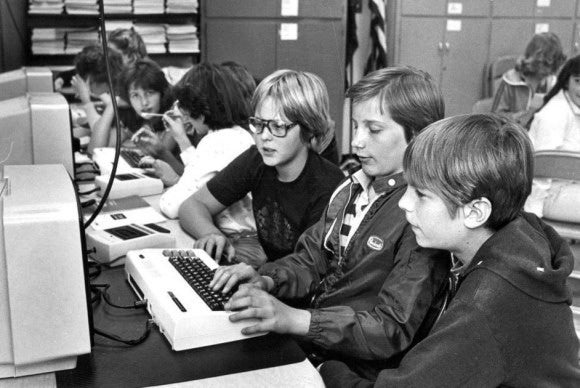
Image by Dave Buresh/Denver Post
Of course, the Apple II wasn’t the only computer to be found in schools. Many districts (and individual schools) experimented with popular home computer models of the day, including those from TI, Radio Shack/Tandy, Atari, and Commodore. In this 1982 photo, three boys use a Commodore VIC-20 (first released in 1980) at a school in Denver, Colorado. The VIC-20 shipped with only five kilobytes of RAM, which made for an inexpensive but very limited machine.
Radio Shack TRS-80 Model III lab (1982)
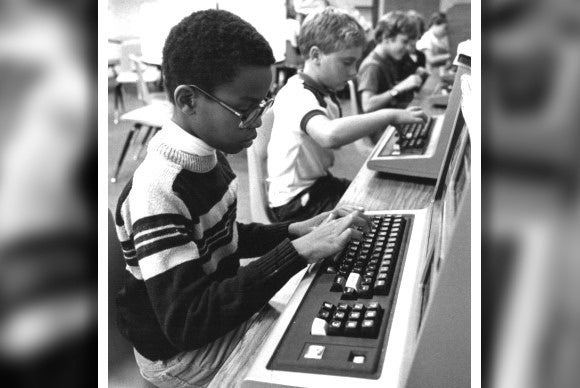
Image by Nancy Leigh Williams
Radio Shack pursued the U.S. grade school education market heavily in the early 1980s, although its machines never received the same market penetration as Apple. Here we see kids typing away on a series of Radio Shack TRS-80 Model III computers, a silver all-in-one machine first released in 1980.
Mac SE lab (1987)
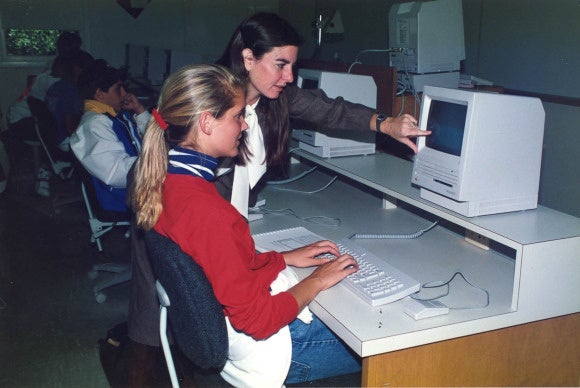
Image by Menlo School
Once the Macintosh launched in 1984, the GUI-based wonder began to make its way into U.S. schools, slowly replacing aging Apple II machines throughout the 1990s. This 1987 photo from Menlo School in Atherton, California gives us a peek at a brand new Macintosh SE lab. Judging by the wires, the machines appear networked together with AppleTalk and linked to a server machine with an external hard drive (seen on the lectern facing away from the camera), which would have been controlled by the teacher.
Atari 800s go to school (1985)
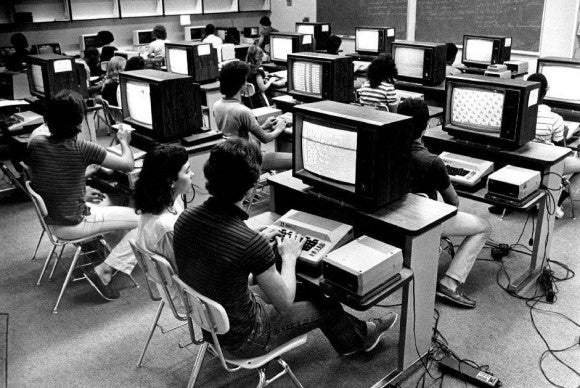
Image by Miami Herald
Even more rare than a computer lab stocked with Commodores or TRS-80s was a lab stocked full of Ataris. But that’s exactly what we see in this 1985 photo from Miami, Florida: a room with at least twelve Atari 800s (Atari’s high-end 8-bit computer, first released in 1979), twelve 810 disk drives, and twelve large TV sets—with a line of Apple IIs along the back wall, of course. I think I see one TRS-80 Model I in there as well (upper left corner). It was quite the lab, although the educational software selection for the Atari 800 was miniscule compared to the Apple II.
Commodore PETs (1980)
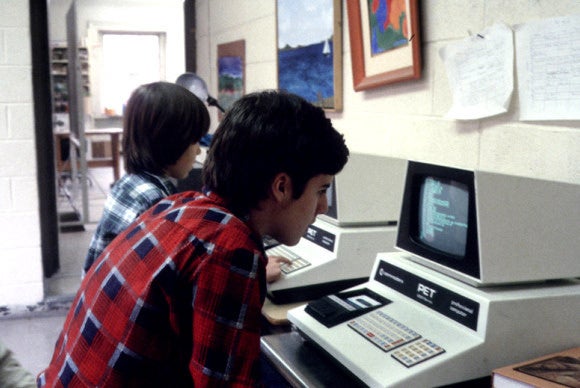
Image by Kim Moser
Programmer and American computer consultant Kim Moser took his camera to school in New York City some time in 1980 to capture this photo of his school’s first computer room. In it, we see some of his classmates learning programming on 1977-era Commodore PET computers. These all-in-one, metal chassis machines, which featured built-in data cassette drives and chiclet keyboards, predated Commodore’s later hits, the VIC-20 and Commodore 64. The Commodore PET vied for success in the early home computer market against the Apple II and TRS-80 Model I.
VT-100 series dumb terminals (1986)
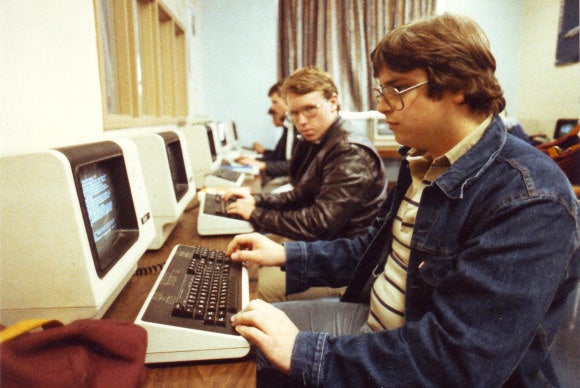
Image by BC High Archives
With the rise of personal computers, it became very rare in the mid-1980s to witness a scene like this one from Boston College High School in Boston, MA. Here we see a lab full of DEC VT-100 series dumb terminals, which were not computers unto themselves, but mere gateways to a bigger computer somewhere else. They would have been connected to a mainframe computer such as a DEC PDP-11 or VAX via RS-232 serial links. This was fairly advanced for a high school at the time.
IBM PCs at Clemson University (ca. 1987)
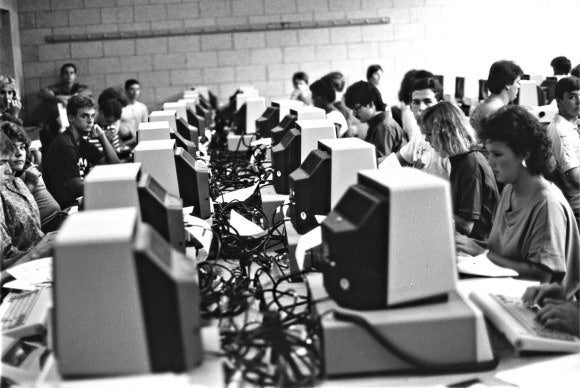
Image by Clemson University
With all the success Apple had in U.S. education, you’d think there wouldn’t be room for IBM. But Big Blue made inroads into education with its Writing to Read program, which taught elementary school kids how to read using special software running on IBM PCs and accompanying workbooks. IBM machines were also present on the college level as well—here we see a room full of IBM PC or PC XT machines at Clemson University some time in the late 1980s.
After the 1980s, school computer labs in the U.S. were dominated mostly by Apple and IBM machines. Today, computer labs are becoming an endangered species, with more schools relying on notebook PCs and tablets that don’t have to be tied to a particular room. But wherever they’re used, computers remain an important part of education in the U.S.




